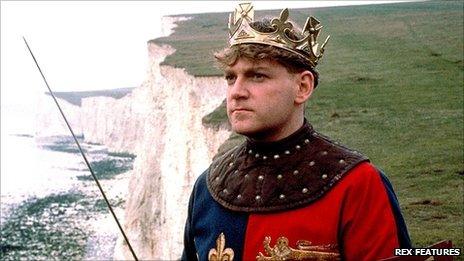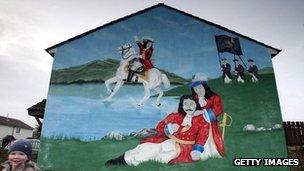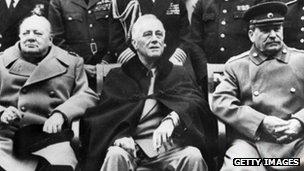Viewpoint: Agincourt, WWII and other great British 'myths'
- Published

Every nation has its favourite tales from the past, but how accurate are they? On the anniversary of the Battle of Agincourt, Simon Jenkins, author of A Short History of England, casts a critical eye over British legends.
Events in history like the Norman conquest, the "Glorious Revolution" and the American revolution have become rooted in national myth.
At the Battle of Agincourt, English forces defeated the numerically superior French.
It is a victory that lives on in the popular imagination thanks to the speech delivered on the eve of battle by the monarch in William Shakespeare play Henry V.
Actually, the truth can be a little different.
Norman Conquest, 1066
Myth: Good Saxons versus Bad Normans - with an arrow as the clincher
To every English school child it evokes a Saxon hero, Harold, and a French villain, William, who met and fought at the Battle of Hastings.
The outcome, we are told, was decided by an arrow in Harold's eye. But history is seldom as commonly related.
Harold, son of Godwin, was an Anglo-Dane with no claim to the throne beyond Edward's deathbed blessing.
William was no Frenchman, but descended from the Norse warrior Rollo and granted Normandy by the French king Charles the Simple in 911. He, too, had no claim beyond the late King Edward's apparent, but earlier, blessing. Both Harold and William were of Viking descent.
To cap it all, Harold's death was even more gruesome. Post-eye injury, he was hacked to pieces and was so mutilated that his mistress, the charmingly named Edith Swan-Neck, had to be summoned to identify its parts.
The Battle of Agincourt, 1415
Myth: England's triumph
"For England, Harry and St George" ranks with Trafalgar and Waterloo in the annals of English arms. It was the climax of English success in the French wars.
Henry V was recognised by the Burgundians and most of Europe as King of France. Ironically, he was the first who was believed not to have spoken French.
Henry returned to London to a hero's welcome, with city aldermen coming to meet him at Blackheath and escorting him for five hours to London Bridge. Marrying the French Queen Catherine supposedly ended the 100 years' war.
But then it took five years for the French finally to capitulate at the treaty of Troyes (1420) and Henry to enter Paris in triumph. Worse, England was unable to hold in peace what it had won in war. Henry could not stay in Paris and keeping an army on mainland Europe was expensive.
In 1422 he succumbed to the battlefield curse of dysentery and the glittering new empire fell upon the shoulders of his 10-month-old son. A mere seven years after Agincourt, war broke out. Inevitablement.
The Glorious Revolution, 1688
Myth: The revolution was glorious
The Catholic James II ("dismal Jimmy", as Nell Gwynne called him) came to power in 1685, but lasted a mere three years before fleeing to France in what came to be called the "Glorious Revolution".
James's flight and his replacement by the Protestant William of Orange was viewed as an example of pragmatic, bloodless reform, in contrast to the current and future convulsions elsewhere in Europe.

William of Orange's legacy is still revered by many
The truth is a little different. It was bloodless only because James capitulated. William's Dutchmen invaded illegally and with main force, from a land with which England had only recently been at war.
He brought a huge fleet of 463 ships and some 40,000 men. Parliament had not requested such an invasion, the King clearly hadn't and the "invitation" from six peers and a bishop was constitutionally irrelevant. England was attacked by a foreign ruler to usurp a legitimate monarch.
The invasion was clearly treasonable but, as the saying goes, "if treason prosper, none dare call it treason".
American Revolution, 1774-83
Myth: The American colonists had nothing to lose but their chains
The American War of Independence began as nothing of the sort.
It was essentially an argument between loyalist and radical British subjects over trade and taxes, only gradually acquiring the rhetoric of civil rights and liberties. Even today that argument is mired in chauvinism.
London protested that a derisory £1,400-a-year in revenue was being gathered from the 13 colonies to pay for having been rescued by Britain from French autocracy in the Seven Years War.
To call this rescue "absolute despotism", as the Americans did, was absurd. The protested Stamp Acts were imposed throughout the empire, as were other trade restrictions, while the colonists enjoyed their own assemblies and were for the most part autonomous.
As a colony with self-governing rights, America was far better treated than Ireland.
World War II, 1939-45
Myth: Britain won World War II
World War II devastated half the globe, killing an estimated 20 million soldiers and 40 million civilians.
Instant histories of the war - not least Winston Churchill's own - depicted it as Britain isolated and alone against the might of Germany.

Churchill sat alongside Roosevelt and Stalin at the Yalta conference - but was Britain's role overstated?
This was true only for a period in 1940-1941, when little fighting was done. By the time of the Yalta Conference in February 1945, it was Roosevelt and Stalin who divided the world.
Compared with the global total, British losses were comparatively modest. Some 375,000 service personnel were killed, just over half the number lost in World War I, and 60,000 civilians had died in air raids.
Some 2% of the total war deaths were British, against 65% that were Soviet. The USSR and America won the war with Britain as something of an also-ran.
Simon Jenkins is the author of A Short History of England.